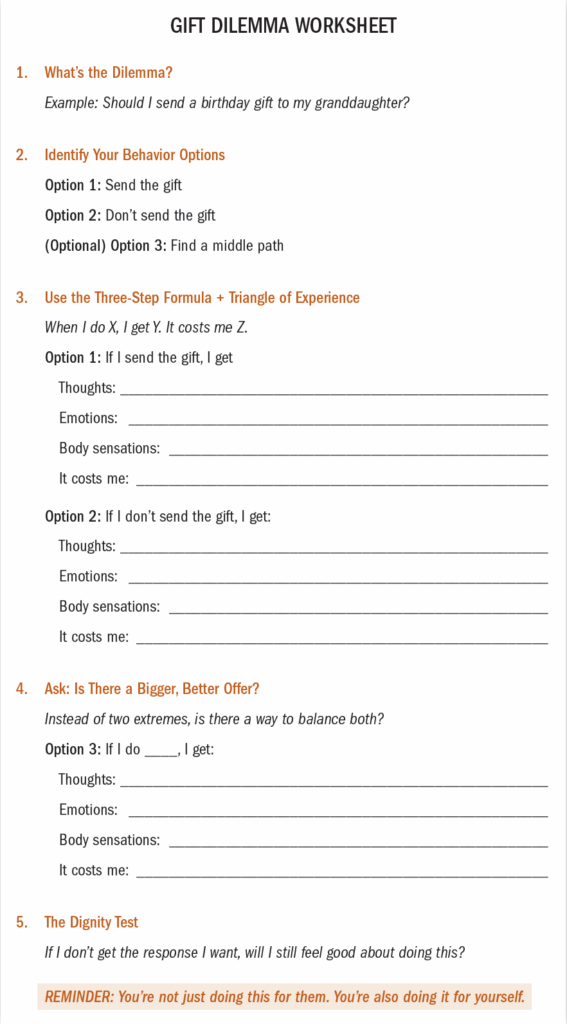Choosing dignity over desperation
Most estranged parents push harder—bigger gifts, longer letters, one more “just checking in” text. But here’s the hidden cost: your peace, your dignity, and the energy you need to heal.
That’s exactly where one couple found themselves. When they walked into my office, they carried more than stories about their estranged son and his family. They carried confusion, heartbreak, and a sense of helplessness that was slowly eroding the quality of their lives.
The husband admitted, “I don’t know what to do that will make a difference.” His wife added, “It feels like we’re always in a holding pattern—waiting to be let back in.”
Estrangement can leave even strong people feeling powerless. That’s where we began—by exploring a counterintuitive move that helped them move forward and reclaim dignity without giving up.
The Hidden Rules of Estrangement
At first, the couple wanted answers. The wife said, “I don’t even know what I did wrong. All I know is that I must have broken one of our daughter-in-law’s unspoken rules.” The husband reflected, “I’ve been living like I’m waiting for parole.”
As we unpacked their story, a picture emerged: Estrangement rarely comes down to one dramatic event. It’s usually the product of unspoken expectations and shifting power dynamics.
The first step wasn’t “fixing” the estrangement. It was learning to respond to it differently.
A Response to Silence: The Gift Dilemma Worksheet
Silence in estrangement isn’t neutral. It lands like rejection, corrodes self-worth, and fuels self-blame. So how do you make decisions in that painful space?
The couple was facing one of the hardest questions estranged parents ask: After two and a half years of no contact, do we continue to acknowledge birthdays?
The wife wrestled with it: “Sending a birthday card is more about acknowledging my role as a mother and a grandmother.”
So I introduced a tool: “When I do X, I get Y, and it costs me Z.”
It’s deceptively simple. But it changed everything for her.
THE GIFT DILEMMA WORKSHEET
Step 1: What’s the Dilemma?
Should I send a birthday gift to my granddaughter?
Wife: “When I send gifts, I get nothing back, and it costs me my dignity.”
Step 2: Identify the Behavior Options
- Option 1: Send a gift
- Option 2: Don’t send a gift
Step 3: Use the Three-Step Formula + Triangle of Experience
When I do X, I get Y. It costs me Z.
- If I send a gift, I get… » Thoughts: “She’ll know I remembered.”
- » Emotions: Hope, love, but sadness if ignored.
- » Body: Tight chest, heaviness if silence follows.
- It costs me: Feeling dismissed when there’s no reply.
- If I don’t send a gift, I get… » Thoughts: “She might think I don’t care.”
- Emotions: Guilt, fear of rejection.
- Body: Knots in the stomach, restless energy.
- It costs me: Feeling dismissed when there’s no reply.
Step 4: Is There a Bigger, Better Offer?
The wife sighed, “This feels like a Catch-22. Both options feel wrong.”
I nodded. When both choices feel lose-lose, no wonder it’s hard to decide. What if there was a third option? A way to protect your vulnerability while continuing to reach out? A way to respect their boundaries without giving up?
She reflected: “I want to stop sending overthe-top gifts because it costs me my dignity when they’re ignored. I can still love my grand daughter without over-giving. I could send a small gift with a simple card.”
- Option 3: If I send a small gift with a simple card, I get…
- Thoughts: “She’ll know I still care, but I’m not desperate.”
- Emotions: Love, less anxiety, less guilt, more dignity. » Body: Calmer, steadier.
- It costs me: Feeling unfamiliar and a little uncomfortable. But also more balanced. I’m not giving up, and I’m not begging for closeness.
Step 5: The Dignity Test
Ask: If this doesn’t get the response I want, will I still feel good about doing it?
I reminded her: You’re not just doing this for them and hoping for a reaction. Just as importantly, you’re doing this for yourself.
Using the Gift Dilemma Worksheet, she discovered a powerful middle path: not begging, not quitting, but stepping back with intention and self-respect.
A single respectful card says: We care, we’re here, and we’re not desperate.
Her realization was powerful: “I want to stop needing their permission to feel okay.” Silence hurts. But it doesn’t have to define you.
You can’t control your children’s response. But you can control how you show up. You can choose dignity-based gestures, reclaim your narrative, and stop waiting for permission to feel okay.
Final Thought
You don’t have to stay stuck in silence or keep guessing what to do. Recovery begins when you choose dignity over desperation— and that choice is always available to you.
If you’re struggling with your own “gift dilemma,” use the Gift Dilemma Worksheet to get clarity.
If you’re looking for guidance and practical strategies for navigating estrangement, let’s talk. Visit drjananderson.com to schedule a fifteen-minute no-cost, no pressure consultation.







